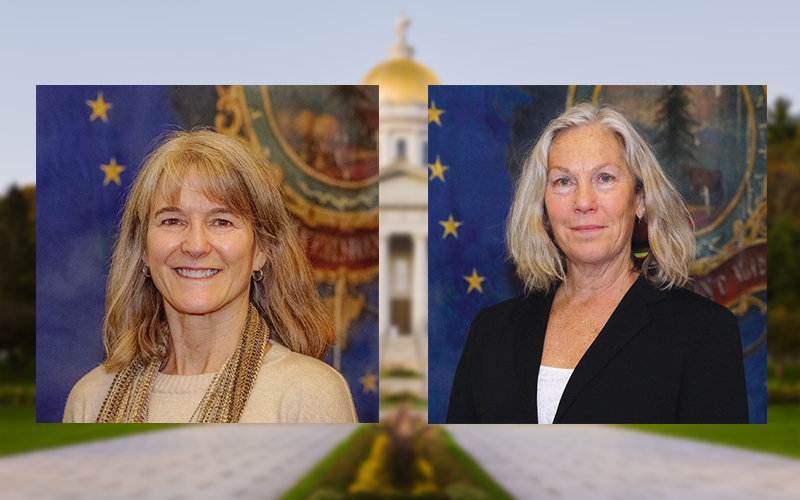By Kari Dolan, D-Waitsfield, and Maxine Grad, D-Moretown
The FY2023 state budget (H.740) totals $8.3 billion, a 5% increase over the current fiscal year. The budget honors the commitment the Legislature made at the beginning of the pandemic: to support Vermonters, their families and communities across all 14 counties, and to leave no one behind in a strong statewide recovery.
That commitment includes investing $453.7 million in federal COVID relief in five broad areas: Economy, Workforce, and Communities; Housing; Broadband Connectivity; Climate Action; and Clean Water. Those investments, added to FY2022 investments, complete the allocations of the $1.2 billion received through the federal American Rescue Plan Act.
The budget includes a long-overdue rate increase of 8% to community mental health providers, designated agencies, specialized service agencies, and home health care providers. It provides millions to support substance abuse disorder prevention and recovery. It includes increased funds for adult day programs, Vermont Legal Aid and the Vermont Health Care Advocate.
We’re investing $96 million in broadband projects and $137.8 million in community, workforce and economic development. The University of Vermont base budget is increased by $10 million, the first increase in 14 years. The Vermont State College System also has a base increase of $10 million, plus $14.9 million to serve as a “bridge” in their ongoing transition to fiscal and operational stability. Coverage is expanded by $4.9 million for working families within the Child Care Financial Assistance Program.
This year’s investments in housing programs, including the “missing middle” and manufactured housing, tally $90 million. Transformational climate and water initiatives include $80 million for weatherization and $45 million for municipal energy resilience grants. There is also $8 million for advanced metering infrastructure and over $60 million for additional electrification initiatives.
INVESTING IN OUR WORKING LANDS
As we know in our communities, our working lands play a critical role in climate change mitigation, regional food security, and the state economy. The Legislature doubled the annual appropriation for the Working Lands Enterprise Initiative, which provides technical and financial assistance to innovative entrepreneurs at the forefront of our working lands economy. These strategic investments have the potential to transform our rural communities. By employing capital assistance to Vermont farmers and forestry workers, we’re demonstrating our commitment to keeping the working landscape vibrant and vital and to supporting the conservation impact of these businesses.
NEONIC PESTICIDES AND PROTECTING OUR POLLINATORS
H.626 aims to limit the prophylactic use of seeds coated with neonic pesticides -- for example, treated corn and soybean seeds. Neonic pesticides pose concerns for the health of our pollinator species (most importantly, bees). This bill, while not a ban, seeks to determine the pest pressure on Vermont farms to determine if this class of pesticide is necessary. To protect pollinator biodiversity and food security, shifting to more sustainable practices is an important stride forward.
INVESTING IN WORKFORCE AND ECONOMIC DEVELOPMENT
S.11 is a significant workforce and economic development bill that addresses the negative economic impacts of COVID-19 on our employers, workers and families and establishes opportunities to grow Vermont's economy for the future.
The bill creates or enhances programs to increase workforce participation, and to reinforce and sustain workers in nursing, mental health care, child care and the trades. It includes scholarships, forgivable loans, education, training and internship programs.
S.11 helps Vermonters. It provides for economic development programs to support businesses and municipalities, sick leave related to COVID-19, tax credits, and assists specific sectors, including the creative economy.
In total, $113.5 million is appropriated using ARPA, General and Education Funds to achieve these goals. A few highlights include:
- Forgivable loans for businesses ($19 million).
- Support for creative economy ($9 million).
- Nursing and healthcare ($12.5 million).
- Support for trades ($4.5 million).
- COVID paid family leave ($15.18 million).
- Unemployment insurance ($8 million).
- Encourage new Vermonters ($5.93 million).
- Community recovery and revitalization grant program ($10 million).
- Downtown and village tax credit ($2.45 million).
- Continuation of Everyone Eats program ($1.3 million).
UNIVERSAL ACCESS TO BROADBAND
Last year, we passed H.360, dedicating $150 million of federal stimulus funds to the construction of publicly-controlled broadband infrastructure in the most underserved parts of the state. The Vermont Community Broadband Board, established by H.360, has already distributed the $150 million in preconstruction and construction grants to all nine of Vermont’s Communication Union Districts. This year, we’ve allocated an additional $95 million of ARPA funds to support this infrastructure build. These funds will be supplemented by an additional $100-plus million from the Infrastructure Investment Jobs Act funds in the next year with the aim of reaching every Vermont household with affordable, high-speed internet.
EXPANDING SAFE AND AFFORDABLE HOUSING
Given Vermont’s critical housing needs, bolstering our housing stock is a top priority. Through federal COVID relief funds, over $42 million was earmarked this year in S.210 and S. 226 to help Vermont renters and homeowners. With this funding, we were able to:
- Dedicate $20 million toward forgivable loans to property owners to bring rental properties not up to code back online, plus incentivize the construction of new Accessory Dwelling Units to expand Vermont’s rental housing stock.
- Direct $22 million to subsidize new construction to lower costs for middle-income homebuyers, plus $1 million to the Vermont Housing Finance Agency (VHFA) for down payment grants for first-generation homebuyers. Repair and improvement grants will also be available for manufactured homes.
- Reform zoning laws, expand tax credits, and create pilot projects to encourage denser development and more vibrant town centers.
- Create an Advisory Land Access Board, composed of representatives of groups that have faced historic discrimination in land and home ownership. The new board will work with the Vermont Housing and Conservation Board and its partners to reduce current disparities as a result of that discrimination.
- Extend additional protections from discrimination and harassment for renters and homebuyers.
- Create a statewide contractor registry to protect against consumer fraud in residential construction projects with a value of over $10,000.
- Use federal relief money to increase the capacity of the Department of Fire Safety to conduct rental inspections.
Overall, these investments send a clear message to Vermonters that our goal is to provide more safe, healthy and affordable housing as soon as we can.
It has been an honor to represent you. In this report you will find some of this session’s highlights. Please stay in touch and be well! Rep. Kari Dolan:












